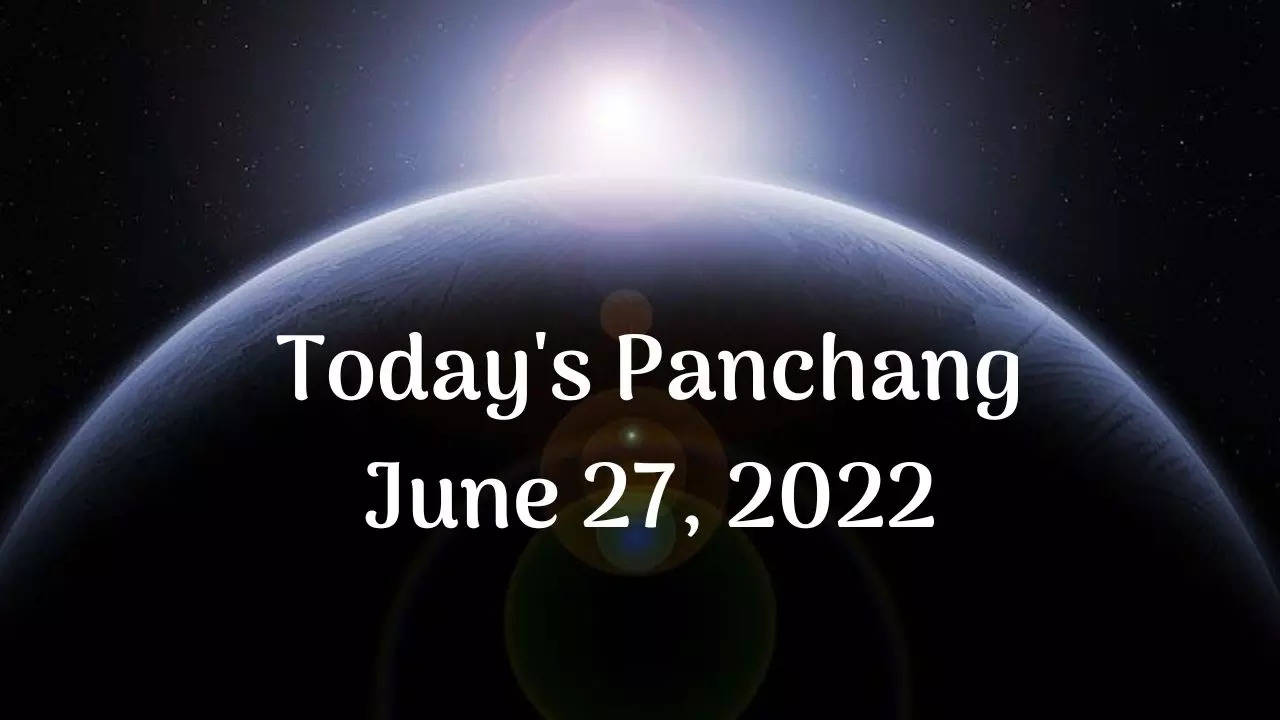Today's Panchang, June 27, 2022: Check out Today's Tithi, Shubh muhurat, Rahu Kaal and other details
Today's Panchang, June 27, 2022: Today is the Chaturdashi Tithi (Day 14), Ashadha, Krishna Paksha (waning or dark phase of the Lunar cycle), Somwar (Monday). Scroll down to know today's sunrise, sunset, timings, shubh and ashubh muhurat, nakshatra, etc.

Today's Panchang June 27, 2022
Today is the Chaturdashi Tithi (Day 14), Ashadha, Krishna Paksha (waning or dark phase of the Lunar cycle),Somwar (Monday). So, observe the Somwar vrat today and read on to know what astrologer Pandit Sujeet Ji Maharaj says about today's Panchang:
- Worship Goddess Durga and Lord Shiva
- Read the Durga Saptashati, Shiva Purana
- Perform Rudrabhishek in a Shiva Temple by offering milk, Gangajal, honey and Bel Patra (Vilva leaves).
- Recite the Shri Ramcharitmanas
- Perfform Shiva Puja and chant the Maha Mrityunjaya Mantra
- Pray to Goddess Parvati, donate religious books and do charity.
Today's Panchang June 27, 2022
What is a Panchang?
| Day | June 27, 2022, Somwar (Monday) |
| Tithi | Chaturdashi Tithi (Day 14) |
| Paksha | Krishna Paksha (waning or dark phase of the moon). |
| Month | Ashadha |
| Sunrise | 5:24 AM |
| Sunset | 7:24 PM |
| Nakshatra | Rohini Nakshatra |
| Surya Rashi | Mithuna Rashi (Gemini) |
| Chandra Rashi | Vrish Rashi (Taurus) |
| Karan | Vishti |
| Yog | Shool |
| Shubh Muhurat (Auspicious time) Abhijeet Muhurat | 11:57 AM to 12:49 PM |
| Shubh Muhurat (Auspicious time) Vijaya Muhurat | 2:24 PM to 3:15 PM |
| Shubh Muhurat (Auspicious time) Godhuli Muhurat | 6:04 PM to 6:35 PM |
| Ashubh Muhurat (Inauspicious time) Rahu Kaal | 7:30 AM to 9:00 AM |
The Panchang is a calendar based on the traditional units of the Hindu timekeeping system that documents significant time (muhurat and kaal) of all the days, including the Nakshatra that remains in effect besides sunrise, moonrise timings and several other details.
In addition, the Panchang registers the Tithi (date), Nakshatra (stars), Yoga, Karana and Vaar. Hindus follow the Lunar and the Solar calendars to determine significant events and dates. Interestingly, the Lunar calendar can be classified into Purnimant and Amavasyant.
The former is based on the Lunar cycle that ends with the Full Moon Day (Purnima), while the latter is influenced by the Lunar phase that ends with the New Moon Day (Amavasya).
Trending:
End of Article
Subscribe to our daily Newsletter!
Related News





Hanuman Janmotsav 2024: Things Women Should Keep in Mind While Worshipping Bajrangbali

Should Lord Hanuman’s Birth Anniversary be Called Janmotsav or Jayanti? Know the Difference Between the Two

Chaurasi Mandir: The Temple Where the Court of Yamraj is Held to Determine a Person’s Future Path

Puja Path Niyam: Does the Extinguishing of the Lamp During Worship a Good or Bad Omen

Know the Interesting Story About Why Mother Sati's Father Detested Mahadev, the God of Gods?









